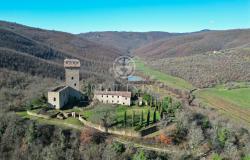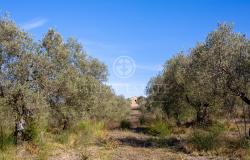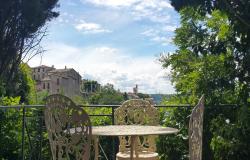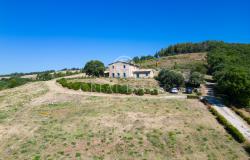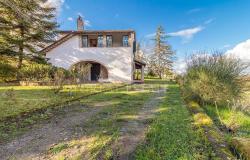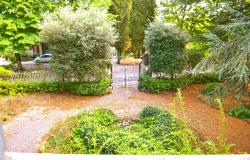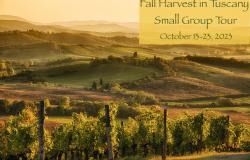Meet the Reverend Russell Ruffino, vicar of the Church of the Resurrection in Orvieto [Umbria]. The Church is recognised as a mission church of the Convocation of American Episcopal Churches in Europe and serves the English speaking people of its area. Today Father Russ talks to Italy Magazine about the Church and its mission and tells us his own fascinating story….
Russ, how does a vicar from New Jersey come to be in Orvieto?
Well, I retired from my post as a rector in Rhode Island in 2007 and was expecting to lead a quiet life. I didn’t know at the time that my friend, the Rector of St Paul’s Episcopal Church in Rome, was thinking of establishing a mission in Orvieto. He needed someone who spoke Italian, was familiar with Italian culture and who, importantly, would not demand a high salary. I seemed to fit the bill and in 2008 my friend recommended to the Bishop that I be appointed.
How did your wife feel about a move to Italy?
She thought it was a great idea.
Are you of Italian descent?
Yes, my father was born in Modica [Ragusa, Sicily] . My paternal grandfather was killed in the First World War and my grandmother decided to emigrate with my father and brother. They settled in Jersey City, New Jersey. In Sicily the men in my family had been shepherds and now I’m a shepherd of a different kind.
Did you speak Italian at home?
We spoke a mixture of dialects and the family would throw in English words to make themselves understood. When I went to Italy and lived as a student in Rome I learnt the language from scratch.
Did you always want to go into the Church? Presumably your family were Catholics?
 I began thinking about going into the Church when I was about 13 or 14. Yes, we were Catholics and I was ordained as a Roman Catholic priest. It was while I was teaching at the Catholic University in Washington DC that I realized that I was not in agreement with all Catholic doctrine. In the early 1980s I began attending the Episcopal Church. I was received as a priest by the Bishop of Rhode Island in 1990.
I began thinking about going into the Church when I was about 13 or 14. Yes, we were Catholics and I was ordained as a Roman Catholic priest. It was while I was teaching at the Catholic University in Washington DC that I realized that I was not in agreement with all Catholic doctrine. In the early 1980s I began attending the Episcopal Church. I was received as a priest by the Bishop of Rhode Island in 1990.
Tell us about Orvieto as you see it.
Oh, it’s wonderful. Its origins go back to pre-Christian times and there are Etruscan tombs here. The town is built on a hill one thousand feet above a valley so no defence wall was ever needed. The town was an occasional residence for the Popes from the eleventh century onwards and Henry V111 sent his request for a divorce from Catherine of Aragon to Pope Clement V11 in Orvieto. The town is also famous for its part in the Miracle of Bolsena and commemorates this event annually.
Orvieto is in a very green area and the countryside is lovely. The people are among the warmest and most welcoming I have ever met and I love to just walk up and down, greeting folk and being greeted.
But we mustn’t forget the wine! The men who worked on the Cathedral’s façade had the good sense to ask for part of their payment in the local wine. The area is also well known for the production of ceramics.
How was the Church of the Resurrection set up in Orvieto?
 The Rev. Susan Skillen, the wife of the Director of the Gordon College Programmes in Orvieto, Dr. John Skillen, was ordained an Episcopal priest in 2005 and she began to gather Anglicans and Episcopalians for worship on Sundays. They gathered in Susan and John’s apartment, then in a convent school, later in a meeting room in the building where the Roman Catholic Bishop of Orvieto resides, and then in a multi-purpose room at Gordon College. St. Paul’s Episcopal Church in Rome took the congregation under its wing and began to support the endeavour financially. Since March, 2009, the Church of the Resurrection has been located on the Corso Cavour, the main street in town, in office space which has been made into a very attractive chapel.
The Rev. Susan Skillen, the wife of the Director of the Gordon College Programmes in Orvieto, Dr. John Skillen, was ordained an Episcopal priest in 2005 and she began to gather Anglicans and Episcopalians for worship on Sundays. They gathered in Susan and John’s apartment, then in a convent school, later in a meeting room in the building where the Roman Catholic Bishop of Orvieto resides, and then in a multi-purpose room at Gordon College. St. Paul’s Episcopal Church in Rome took the congregation under its wing and began to support the endeavour financially. Since March, 2009, the Church of the Resurrection has been located on the Corso Cavour, the main street in town, in office space which has been made into a very attractive chapel.
There are a few Roman Catholic Churches which have fallen out of use in Orvieto and we are hoping that the Catholic Bishop will let us have the use of one of these soon. We have an excellent relationship with the Catholic Church here.
That’s interesting. Was there any opposition in the town to a woman priest?
No, everyone was very welcoming to Susan. However, I don’t think that the Bishop would have considered letting us have the use of a building which had been a Catholic church while a woman priest served the mission. That would have been too much for some of the more traditional citizens of Orvieto to take!
What advantages would the use of a proper church building have?
Apart from the space, we would be able to put up a permanent sign. Like everywhere in Italy, Orvieto has strict rules about where and when you can put up signs. At the moment, we are only allowed to display one on Sunday mornings.
Who makes up your congregation?
Australians, New Zealanders, American and British people. Some are married to Italians. It’s a fluctuating congregation because many of our number are not resident in Italy all year round.
What language do you conduct your services in?
In English but we have bilingual prayer books available. We use the American Book of Common Prayer. Many of the townsfolk are interested in my sermons so I translate them to circulate by email or by hand.
What help can you offer people?
 The sacramental services of the Church, of course, but we can also offer counsel to settlers. We can help with something as simple as a hotel for someone to stay in when they first arrive and I can offer my linguistic skills. We are always there for people in trouble and, as a priest, I have to respect confidentiality. Our congregants are knowledgeable people and between them they can give a lot of good advice. It’s like an extended family.
The sacramental services of the Church, of course, but we can also offer counsel to settlers. We can help with something as simple as a hotel for someone to stay in when they first arrive and I can offer my linguistic skills. We are always there for people in trouble and, as a priest, I have to respect confidentiality. Our congregants are knowledgeable people and between them they can give a lot of good advice. It’s like an extended family.
Something very special happened last Christmas, didn’t it?
Ah, yes. On 12th December, with the choir from St. Paul’s in Rome, we presented a Christmas Concert to the inmates at the prison here and gave them gifts of much needed items from underwear to toothpaste. Afterwards we went carol singing through the streets of Orvieto, which delighted the citizens. At the end of the day we served mulled wine, hot chocolate and panettone to all in the piazza in front of the Church of Sant’Andrea.
And we must ask about your “mission to dogs”.
That started one cold winter when I saw a bedraggled little dog wandering the streets of the town. I thought he was a stray and I started carrying biscuits to give him. I later learnt that his name was Archimedes and that he had owners. In fact, he was the “canine mayor” of Orvieto, known to everybody. People kept telling me that there was no need for me to take care of Archimedes but I went on giving him biscuits. Then one day I saw him standing in the street, beautifully groomed and smart. He’d obviously been looking pathetic just for me! I still carry dog biscuits, though, and I ask dog owners if I can pet their animals and give them a biscuit. It’s a way of getting known and getting to know the people. In St Francis country the image of a cleric giving food to dogs does not cause surprise. We have the Blessing of the Animals here on the nearest Sunday to St Francis Day.
That’s a lovely story. Do you have any advice for people who would like to settle in Italy?
I would say, “Talk to me about what you are looking for”. Italy can respond to anyone and wherever you go in this country, you’ll learn a little more about how to live, about what matters and about human relations in a very special way. Italy helps to open us up and we get to eat and drink well, too!
And what message would you like to convey about your mission?
That we’re here to help, in whatever way we can. We are here for people and to make our embrace as wide as God’s.
Russ, thank you for talking to Italy Magazine.
